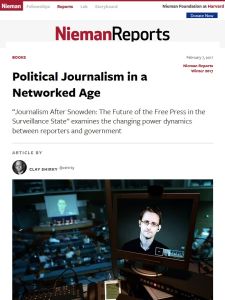Join getAbstract to access the summary!

Join getAbstract to access the summary!
Clay Shirky
Political Journalism in a Networked Age
Journalism After Snowden
Nieman Reports, 2017
What's inside?
As the world grows more connected, how will reporters ensure they can publish news without government intervention?
Recommendation
To continue to publish newsworthy stories while reducing government intrusion, journalists need to consider how they communicate and with whom. getAbstract recommends this edited excerpt from new media expert Clay Shirky’s contribution to the anthology Journalism After Snowden to journalists, reporters and those with an interest in the complex relationship between the press and governments.
Summary
About the Author
Clay Shirky is an author, consultant and teacher of the social and economic effects of Internet technologies and journalism. He teaches at New York University and is a fellow at Harvard’s Berkman Center for Internet and Society.



















Comment on this summary